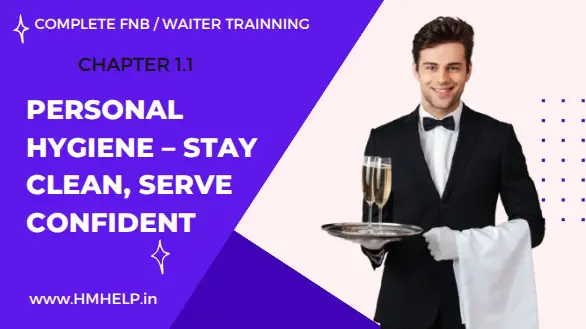Why Personal Hygiene Matters in Hospitality
“You’re not just serving food—you’re serving trust.”
That’s a line every F&B professional should remember.
In hospitality, guests expect cleanliness, professionalism, and safety. Hygiene plays a key role in customer satisfaction and health, and a minor lapse can damage the reputation of the server and the restaurant alike.
💡 Did you know? According to the World Health Organization (WHO), poor hygiene in food service contributes to over 600 million cases of foodborne illnesses each year globally.
Real-World Examples: When Hygiene Makes or Breaks Service
- Bad Example: A colleague of mine once forgot to trim his nails before a dinner shift. A guest noticed and subtly mentioned it. The table didn’t order dessert, and the tip? Zero.
- Good Example: At The Retreat Palm Dubai, we were trained to check grooming every day before shift. I remember a guest personally appreciating how clean and polished we looked—and she left a 200 AED tip just for the service.
Hygiene isn’t just about health—it’s about perception and professionalism.
Daily Hygiene Checklist for Waiters & Waitresses
Before every shift, check yourself against this list:
✅ Personal Grooming:
- Freshly showered
- Neatly trimmed nails (no polish for men)
- Clean, brushed teeth and fresh breath
- Deodorant (non-overpowering)
- Hair tied back (if long), clean and neat
- Minimal or no jewelry
✅ Uniform Hygiene:
- Clean, wrinkle-free uniform
- Apron washed and changed daily
- Polished shoes
- Name tag visible
✅ Hands & Skin:
- Wash hands every 30 minutes or after:
- Clearing dishes
- Handling money
- Sneezing, coughing, or touching face
- Use hand sanitizer when needed
- Moisturize dry hands (cracks trap bacteria)
Grooming Standards in restaurant staff
Most luxury hotels and restaurants follow strict SOPs (Standard Operating Procedures) regarding grooming. Here’s a quick overview:
| Grooming Area | Standard |
|---|---|
| Hair | Clean, no strong smell, tied up (for long hair) |
| Facial Hair | Either clean-shaven or neatly trimmed beard |
| Perfume/Cologne | Mild, non-irritating |
| Fingernails | Short, clean, unpolished |
| Makeup (if any) | Light and professional |
✨ Pro Tip: Always carry a mini grooming kit in your locker (comb, breath mints, deodorant, hand sanitizer, lint roller).
Common Mistakes to Avoid
- Using strong perfumes that may affect guests with allergies
- Ignoring sweat stains—guests notice
- Handling cutlery or plates by the top
- Touching your face or hair frequently
- Wearing stained or wrinkled uniforms
- Using your phone during service and not sanitizing hands after
Personal Experience: What I Learned as a Waiter in Dubai
When I started working as a trainee waiter in Dubai, I didn’t realize how seriously personal hygiene was taken until my supervisor pulled me aside for forgetting to shine my shoes.
That moment was embarrassing, but also life-changing.
I learned that guests often judge the quality of food and service through visual cues like uniform neatness, breath, posture, and cleanliness. Since then, I developed a simple ritual: 10 minutes before every shift, I did a self-check. I even helped my colleagues build the same habit.
Result? Our team got regular positive guest feedback and even a performance certificate.
Expert Advice from Industry Trainers
We spoke to Chef Kamal, F&B Trainer at a 5-star hotel in Bangalore:
“Personal hygiene is not just your job—it’s your brand. In luxury dining, servers are brand ambassadors. I’ve seen waiters promoted faster just because of their grooming and discipline.”
Tips from trainers:
- Do weekly self-inspections (ask friends to give feedback)
- Keep extra uniforms handy for long shifts
- Smile genuinely—it’s part of “hygiene for the soul”
FAQs on Hygiene in Hospitality
Q1: Can I wear makeup as a waitress?
Yes, but keep it minimal and professional. Avoid loud colors.
Q2: Is hand sanitizer enough or should I wash my hands?
Sanitizer is useful, but washing with soap and water is essential, especially after handling food or clearing tables.
Q3: What if I have a cold or light flu symptoms?
Inform your supervisor. It’s better to rest than risk infecting guests or coworkers.
Q4: Are tattoos or piercings okay?
Depends on the outlet’s policy. Many fine-dining outlets require visible tattoos or facial piercings to be covered.
Q5: What is the hospitality industry’s hygiene standard?
Most follow HACCP (Hazard Analysis and Critical Control Points) standards along with internal SOPs.
Final Thoughts: Build a Habit, Build a Career
Clean uniform, clean hands, clean reputation.
In the F&B world, hygiene is not a one-time task—it’s a habit that builds guest trust, professional respect, and personal pride. Whether you’re new or experienced, never compromise on cleanliness. It’s the most visible form of discipline.
✅ Key Takeaways
- Hygiene = Trust: Guests notice more than you think.
- Consistency matters: Make hygiene part of your identity.
- Small habits = Big career impact.

